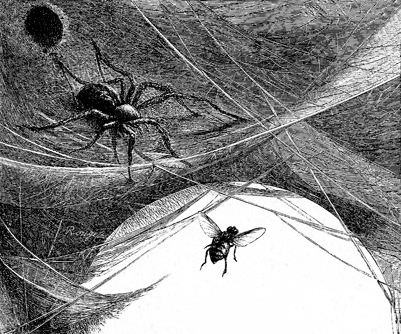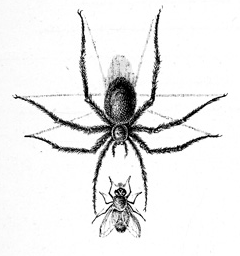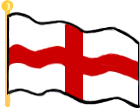The True Story of the Web-Spinner
The True Story of The Web-Spinner
Showing How He Led An Evil Life, And How Vengeance Overtook Him.

The True Story of the Web-Spinner
Poem
Web-Spinner was a miser old,
Who came of low degree;
His body was large, his legs were thin,
And he kept bad company.
His visage had the evil look
Of a black felon grim;
To all the country he was known,
But none spoke well of him.
His house was seven stories high,
In a corner of the street,
And always had a dirty look,
When other homes were neat.
Up in his garret dark he lived,
And from the windows high
Looked out in the dusky evening
Upon the passers-by.
Most people thought he lived alone;
Yet many have averred,
That dismal cries from out his house
Were often loudly heard;
And that none living left his gate,
Although a few went in;
For he seized the very beggar old,
And stripped him to the skin;
And though he prayed for mercy,
Yet mercy ne'er was shown-
The miser cut his body up,
And picked him bone from bone.
Thus people said, and all believed
The dismal story true;-
As it was told to me, in truth,
I tell it so to you.
There was an ancient widow-
One Madgy de la Moth,
A stranger to the man, or she
Had ne'er gone there, in troth;
But she was poor, and wandered out
At nightfall in the street,
To beg from rich men's tables
Dry scraps of broken meat.
So she knocked at old Web-Spinner's door,
With a modest tap, and low,
And down-stairs came he speedily,
Like an arrow from a bow.
"Walk in, walk in, mother!" said he,
And shut the door behind;
She thought, for such a gentleman,
That he was wondrous kind.
But ere the midnight clock had tolled,
Like a tiger of the wood,
He had eaten the flesh from off her bones,
And drank of her heart's blood!
Now after this fell deed was done,
A little season's space,
The burly Baron of Bluebottle
Was riding from the chase;
The sport was dull, the day was hot,
The sun was sinking down,
When wearily the Baron rode
Into the dusty town.
Says he, "I'll ask a lodging
At the first house I come to;"
With that the gate of Web-Spinner
Came suddenly in view.
Loud was the knock the Baron gave-
Down came the churl with glee:
Says Bluebottle, "Good sir, to-night
I ask your courtesy;
I'm wearied with a long day's chase,
My friends are far behind."
"You may need them all," said Web-Spinner,
"It runneth in my mind."
"A baron am I," said Bluebottle,
"From a foreign land I come."
"I thought as much," said Web-Spinner,
"For wise men stay at home!"
Says the Baron, "Churl, what meaneth this?
I defy you, villain base!"
And he wished the while with all his heart
He were safely from the place.
Web-Spinner ran and locked the door,
And a loud laugh laughed he;
With that each one on the other sprang,
And they wrestled furiously.
The Baron was a man of might,
A swordsman of renown;
But the Miser had the stronger arm,
And kept the Baron down;
Then out he took a little cord
From a pocket at his side,
And with many a crafty, cruel knot
His hands and feet he tied;
And bound him down unto the floor,
And said in savage jest,
"There's heavy work in store for you,
So, Baron, take your rest!"
Then up and down his house he went,
Arranging dish and platter,
With a dull and heavy countenance,
As if nothing were the matter.
At length he seized on Bluebottle,
That strong and burly man,
And with many and many a desperate tug
To hoist him up began:
And step by step, and step by step,
He went with heavy tread;
But ere he reached the garret door,
Poor Bluebottle was dead!
Now all this while a magistrate,
Who lived the house hard by,
Had watched Web-Spinner's evil deeds
Through a window privily,
So in he bursts, through bolts and bars,
With a loud and thundering sound,
And vows to burn the house with fire,
And level it with the ground;
But the wicked churl, who all his life
Had looked for such a day,
Passed through a trap-door in the wall,
And took himself away.
But where he went no man could tell;
'Twas said that underground
He died a miserable death,
But his body ne'er was found.
They pulled his house down stick and stone;
"For a caitiff* vile as he,"
Said they, "within our quiet town
Shall not a dweller be!"
Notes
*A caitiff is a contemptible person.
Written by Mary Howitt, author of "The Spider and The Fly".

Thanks and Acknowledgements
This poem and the illustrations are from "Mary Howitt's Poems of Natural History for The Young".
























